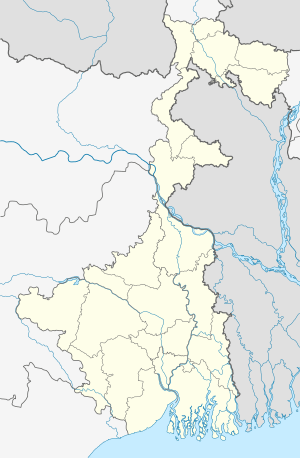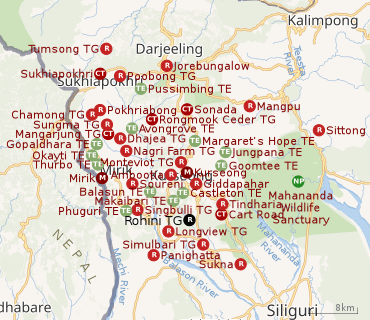Rohini Tea Garden
Rohini Tea Garden is a village in the Kurseong CD block in the Kurseong subdivision of the Darjeeling district in the state of West Bengal, India.
Rohini Tea Garden | |
|---|---|
Village | |
 Rohini Tea Garden Location in West Bengal, India  Rohini Tea Garden Rohini Tea Garden (India) | |
| Coordinates: 26.843478°N 88.289652°E | |
| Country 26.843478,88.289652 | |
| State | West Bengal |
| District | Darjeeling |
| Population (2011) | |
| • Total | 2,752 |
| Time zone | UTC+5:30 (IST) |
| PIN | 734203 |
| Telephone/STD code | 0353 |
| Lok Sabha constituency | Darjeeling |
| Vidhan Sabha constituency | Kurseong |
| Website | darjeeling |
History
Rohini Tea Garden is one of the 8 new gardens in India, developed after independence. It was first planted in 1955 but was closed in 1962, till around the end of the century, when it was taken over by the Saria family and replanting started.[1][2][3] [4]
Geography
 |
| Places and tea estates in the southern portion of Darjeeling Sadar subdivision (including Jorebunglow Sukhiapokhri CD block), Kurseong subdivision and Mirik Subdivision in Darjeeling district CT: census town, R: rural/ urban centre, NP: national park/ wildlife sanctuary, TE: tea estate Abbreviations used in names – TG for Tea Garden (town/village), TE for Tea Estate Owing to space constraints in the small map, the actual locations in a larger map may vary slightly |
Location
Rohini Tea Garden is located at 26.843478°N 88.289652°E.
Of the 1,300 hectares originally planted with plants of Chinese variety, only 38 hectares have survived. 108 hectares planted from 1996 onwards have not yet attained maturity but still produce exquisite tea. Tukuriya, the highest division of the garden, has an average elevation of 4,400 ft (1,300 m). The estate has a new factory.[2][3]
Demographics
According to the 2011 Census of India, Rohini Tea Garden had a total population of 2,752 of which 1,401 (51%) were males and 1,351 (49%) were females. There were 298 persons in the age range of 0 to 6 years. The total number of literate people in Rohini Tea Garden was 1,857 (67.48% of the population over 6 years).[5]
Education
St. John's High School is an English-medium coeducational institution, with residential facilities, established in 1994. It has arrangements for teaching from class V to class X.[6]
Carmel High School is an ICSE board coeducational institution.[7]
Rohini Madhyamik Siksha Kendra is an English-medium coeducational institution was founded in 2008. It had facilities for teaching from class V to class VII.[8] According to a 2010 newspaper report, around a hundred children from 15 surrounding villages studied in the school. However, the rickety condition of the school premises, particularly during rains and storms, forced children to walk 11 km or more to schools. Once, studies were disrupted after the tarpaulin sheets were blown away. Thereafter, the tea garden management provided tin (galvanised?) sheets for the roof.[9]
References
- "Synopsis on Survey of Tea Gardens". Regional Labour Offices under jurisdiction of Joint Labour Commissioner, North Bengal Zone. Retrieved 5 March 2020.
- "Bringing Rohini Tea Estate Back to Life". The World is a Tea Party Site. Retrieved 5 March 2020.
- "Gopaldhara Tea Estate". GTE. Retrieved 5 March 2020.
- "Rohini Tea Estate". Darjeeling Tea Garden – Sona Tea Ltd. Darjeeling Tea Boutique. Retrieved 5 March 2020.
- "2011 Census – Primary Census Abstract Data Tables". West Bengal – District-wise. Registrar General and Census Commissioner, India. Retrieved 3 March 2020.
- "St. John's High School". ICBSE. Retrieved 5 March 2020.
- "Carmel High School Kurseong". ICBSE. Retrieved 5 March 2020.
- "Rohini MSK School". ICBSE. Retrieved 5 March 2020.
- "11 km trek preferred to tin school". The Telegraph, 19 June 2010. Retrieved 5 March 2020.